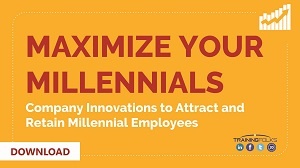TIPS FROM YOUR TRAINING COMPANY
According to Gallup, 21% of millennials reported changing jobs in the last year and it is estimated that millennial turnover costs the U.S. economy $30.5 billion annually.1 As Baby Boomers continue to retire, organizations need to attract more skilled millennial employees to fill the workforce gaps.
But millennials have unique needs in the workplace, and the most successful companies will likely have to adopt new workplace practices if they hope to reduce the high cost of turnover.
Here are 3 common mistakes that organizations make when it comes to their millennial workforce.
1. Inflexible Work Arrangements
A recent article on LinkedIn stated there are 170 U.S. companies that operate entirely through remote work, up from 26 companies in 2014.2 Flexible work arrangements are a benefit that attracts employees and especially millennials to an organization. It is also reported to improve productivity and increase employee loyalty, which goes a long way to reducing the high costs of turnover and recruitment.
Constant improvements in technology have made flexible working arrangements more viable than ever. Virtual organizations can benefit from reduced overhead expenses, including not having to pay for a bricks and mortar location, furniture and equipment. Employees benefit from avoiding long commutes in cities that have become more congested, and work-life balance which is especially popular among younger employees.
Flexible work arrangements can vary – from remote working or telecommuting from a home office or other location either full-time or a few days a week, to choosing when to start and end the work day, and job sharing.
In Deloitte's 2017 survey, the number of millennials reporting they have the ability to work from locations other than the employer's primary site is now 64%, a 21-point jump compared to 2016.3
2. All About the Money
Social responsibility is a key factor for millennials when choosing the organization they work for, bumping salary as the sole decision maker.
The number of millennials who see business as a force for positive social impact is 76%, with 62% considering business leaders as committed to helping improve society, a nine-point increase since 2015.4
More companies are recognizing the importance of corporate social responsibility and giving to their communities as well as larger causes. There are companies like Virgin who among its many entities operates a charitable foundation, Virgin Unite. While not under the Microsoft umbrella, Bill and Melinda Gates have established a foundation as well.
Organizations need not start a charitable organization to contribute to society. Some non-profits have fundraising events that offer corporate challenges, allowing teams of employees to come together and raise money for a worthy cause.
Companies may also sponsor local sports teams or contribute products or services to local fundraising events. Others allow employees to use paid time to do volunteer work and give back to the community.
No matter how your company chooses to give back, be sure to highlight your corporate social responsibility on your website for potential employees to see when they are researching your company. You can also include a reference in your job postings.
3. Lack of career growth and development opportunities
Career development and learning are almost 2x more important than compensation, benefits, work environment.5
The work environment continues to change at a rapid pace, and employees recognize they will have to continually develop their skills to stay relevant. When searching for a new job, many millennials look for companies that offer learning and development opportunities. These can be formal training courses with assigned learning paths, mentoring opportunities, or even informal situations working with cross-functional teams to learn about different aspects of the business.
More than just advertising gym memberships, free lunches and dog-friendly work environments in their job listings, more companies are including learning and development as an important work perk. Demonstrating that your organization supports its employees and is willing to invest in their growth and development can go a long way to attracting millennials and maintaining their loyalty.
To help your company implement changes that will engage your millennials, encourage them to develop their skills and improve performance, download Maximize Your Millennials: Company Innovations to Attract and Retain Millennial Employees.
This free eBook outlines five key areas to create a more millennial-friendly work environment. Use the guide to create or improve your millennial learning and development strategies today and steer clear of the common mistakes companies make that lead to the loss of skilled millennial talent.
1 2016 Gallup How Millennials Want to Work and Live Report
2 Companies go all in on Remote Working
3, 4 The 2017 Deloitte Millennial Survey
5 Bersin in Deloitte Creating a Culture of Continuous Learning

